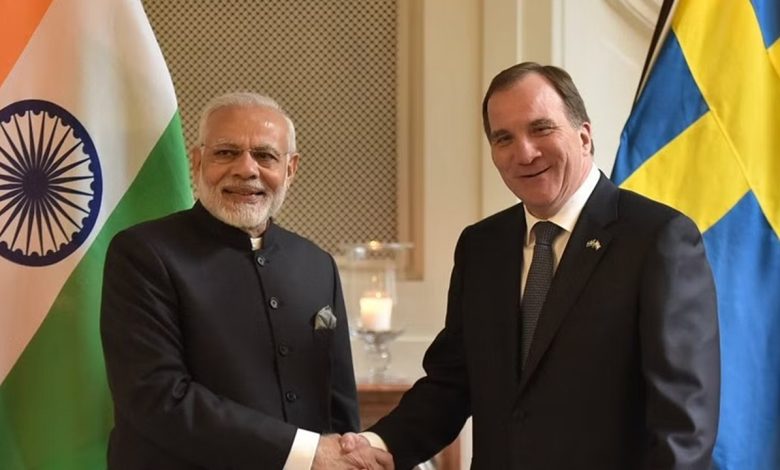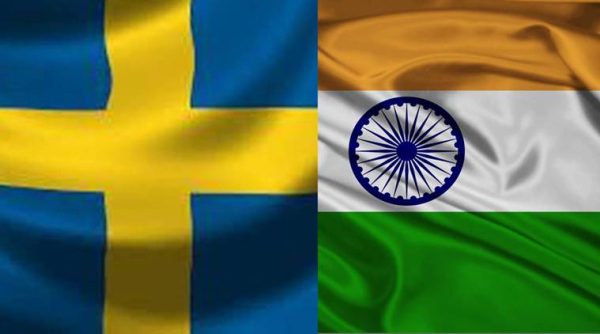
Context – 2023 marks 75 years of bilateral relations between India and Sweden, and it is an occasion to celebrate. Bilateral trade has reached unprecedented levels in the past year, with Swedish companies making significant strides in the Indian market.
The latest Indian administration has shown a keen interest in augmenting and broadening the partnership between the two countries.
Relations over the Years
- Sweden and India have come a long way in the past 100 years. From limited contacts to a flourishing partnership, both countries have developed national wealth through industry and manufacturing. Swedish companies have been key drivers in both domains, and through their work, Sweden and India have found friends in one another.
- Sweden recognized India as an independent nation in 1947, with both countries establishing formal diplomatic relations two years later. India set up a diplomatic mission in Stockholm in 1949.
- In the 1980s India and Sweden worked together on nuclear disarmament issues within the framework of the ‘Six Nation Peace Summit’ (which also included Argentina, Greece, Mexico, and Tanzania).
- In 2013 during the Swedish Presidency, India joined the Arctic Council as an Observer at the Kiruna Ministerial Meeting.
- Both countries have, in the past, joined hands on common causes such as decolonization, anti-apartheid promoting development partnerships, environment, UN Peacekeeping, UN Peacebuilding, and disarmament.
- In 2023, Sweden is celebrating the anniversaries of Ericsson, SKF, Alfa Laval, and Volvo, notable Swedish companies in India.
- India and Sweden celebrated a record year for bilateral trade in 2022, with Swedish companies experiencing strong growth in India.
- Both countries are committed to expanding their partnership and collaborating in innovation, green transition, energy, health, industry policy and more.
Bilateral Agreements
- A range of MoUs and bilateral Agreements exist covering sectors including Science & Technology; Healthcare, Sustainable Urban Development, Renewable Energy, Railways; Space, Polar Science, and Defence.
- There are several Joint Working Groups (JWG) established under many of these MoUs. There also exist agreements on avoidance of Double Taxation Bilateral Investment Protection and Air Services.
- The 19th session of the Indo-Swedish Joint Commission for Economic, Industrial and Scientific Corporation (JCEC) was held in Sweden in October 2019.
India-Sweden Multilateral Engagement
- India and Sweden jointly launched the Leadership Group on Industry Transition (LeadIT) in association with World Economic Forum (WEF) at the UN Climate Action Summit convened by the UN Secretary-General in September 2019 in New York.
- The Stockholm Environment Institute is the Secretariat for Lead IT whose membership has since expanded to 35 members including 16 countries (including France, Germany, RoK, UK, and the USA) and 19 big companies (including Dalmia Cement, Mahindra Group, and SpiceJet).
Key Areas of Cooperation and Collaboration
- Industry and manufacturing are key to building long-term economic growth, and Sweden and India have identified these sectors as key areas of collaboration.
- An active industry policy necessitates partnerships and taking bold steps, and Swedish companies have been key drivers in industry and manufacturing in India for several decades.
- The future belongs to green and sustainable practices, and both Sweden and India are committed to socially and environmentally sustainable practices throughout the entire supply chain.
- There is a clear commitment to this vision from governments and businesses alike, with a focus on digitalisation, the green transition, and the industry of the future.
Way Ahead
- There are opportunities for even closer ties between India and Sweden, including a Free Trade Agreement between the EU and India.
- The strategic importance of the India-Sweden relationship is being reflected at the regional and global levels. Sweden is important for India’s engagement with the Nordic countries and EU as well.
- The European Union presidency offers a chance to explore this possibility, which would have a positive impact on economic and industrial exchange, particularly in cities like Pune where Swedish companies have a strong presence.
- India-Sweden should expand defence and security partnership along with boosting cooperation on climate change, high-tech, and innovation partnership, research and development, healthcare innovation, trade and investment, leadership skill, and industry transition.
- In each of these focus areas, India and Sweden have rich and diverse proficiency based on resource endowment, mobilization, and capacity enhancement implying shared politico-socio-economic and technological progress.
Conclusion
The partnership between India and Sweden has come a long way in the past 75 years. Both nations have identified industry and manufacturing as key to building long-term economic growth, and there is a need to deepen work towards socially and environmentally sustainable practices.






.png)



